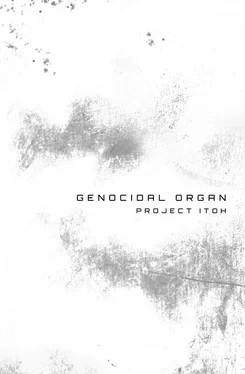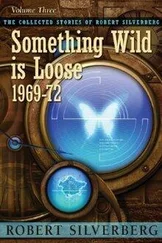Project Itoh - Genocidal Organ
Здесь есть возможность читать онлайн «Project Itoh - Genocidal Organ» весь текст электронной книги совершенно бесплатно (целиком полную версию без сокращений). В некоторых случаях можно слушать аудио, скачать через торрент в формате fb2 и присутствует краткое содержание. Год выпуска: 2012, ISBN: 2012, Издательство: Haikasoru/VIZ Media, Жанр: Старинная литература, на английском языке. Описание произведения, (предисловие) а так же отзывы посетителей доступны на портале библиотеки ЛибКат.
- Название:Genocidal Organ
- Автор:
- Издательство:Haikasoru/VIZ Media
- Жанр:
- Год:2012
- ISBN:9781421550886
- Рейтинг книги:4 / 5. Голосов: 1
-
Избранное:Добавить в избранное
- Отзывы:
-
Ваша оценка:
- 80
- 1
- 2
- 3
- 4
- 5
Genocidal Organ: краткое содержание, описание и аннотация
Предлагаем к чтению аннотацию, описание, краткое содержание или предисловие (зависит от того, что написал сам автор книги «Genocidal Organ»). Если вы не нашли необходимую информацию о книге — напишите в комментариях, мы постараемся отыскать её.
Genocidal Organ — читать онлайн бесплатно полную книгу (весь текст) целиком
Ниже представлен текст книги, разбитый по страницам. Система сохранения места последней прочитанной страницы, позволяет с удобством читать онлайн бесплатно книгу «Genocidal Organ», без необходимости каждый раз заново искать на чём Вы остановились. Поставьте закладку, и сможете в любой момент перейти на страницу, на которой закончили чтение.
Интервал:
Закладка:
Of course, there was also no way of asking my father why he had gone to the effort of trying the second most popular suicide method first. Why did you decide to die? Why did you settle on a gun in the end? You can’t interrogate a dead man. You can’t ask him any questions, and you can’t ask him for forgiveness.
I’d like to tell you that, with a child’s intuition, I picked up the scent of death and was unusually affected by my father’s suicide, but as I said before, that’d be a lie. What I actually remember is that one day my father was there and then one day he wasn’t. He disappeared. Don’t put too much stock in this “children’s intuition” bull.
People are like that—able to disappear without rhyme or reason, without others being able to make sense of their sudden absence.
There were a few times when I asked my mom why my dad killed himself. But then I gradually stopped asking. After all, the only answer I ever got was I don’t know . Every time I asked I would get the same answer and my mother would make the same face of wretched incomprehension.
To depart without giving a reason why is to leave a curse on those you leave behind. Questions linger: Why didn’t I realize something was wrong? What could I have done differently? Was it my fault? And, of course, the dead don’t reply. So there’s basically no way to lift the curse. Time is a great healer, but an imperfect one, as anyone who has ever been assaulted in the dead of night by uneasy, shameful feelings knows. Even those memories consigned to oblivion by the conscious mind may still be in there somewhere, lurking, never completely forgotten by the unconscious mind.
That’s what I mean when I say my mother was under my father’s curse.
There’s one unsolved puzzle about my father’s death that I never asked my mother, not even at the very end. The question of who cleaned up the blood and fragments of splattered brain on the ceiling and walls. Did the police do it? Or was there some sort of specialist cleaning company that you could hire? What sort of slogan did they have—WIPING THE REMNANTS OF YOUR LOVED ONES FROM YOUR WALLS SINCE 1965?
Whoever it was, I have absolutely no conscious memory of it. What I do remember is that once, in my movie-geek teenager years, I watched a Reagan-era oldie called Angel Heart on late-night cable. I remember how it made me shudder: a scene with a woman in full mourning regalia wiping red bloodstains from the wall. I supposed she was the widow of the man who had just killed himself. The movie never did go into detail on that point, and in my mind that scene seemed curiously detached from the rest of the movie.
Come to think of it, I guess it could have been my mother who wiped up my father.

It’s the nature of your work that is causing you so much stress.
I wondered if this was the sort of thing Alex’s counselor would have said to him during their sessions—if he’d been going for any.
Kill, kill, and then kill some more. Plan missions down to the last detail so that you can kill even more people even more efficiently. Conjure up in your mind, vividly, an image of the target you are about to kill. Predict your target’s next movements. Know whether he has a wife, whether he has children, whether he read Harry Potter to his daughter at bedtime.
Would stressful even be the right word to describe this line of work? Alex was a staunch Catholic, so I guess it’s more likely he would have confessed to a priest than gone to counseling. When he was in that little confessional, would he have begged for absolution for all the men he had killed in the line of duty? If so, I wondered if the priest who heard his confession now felt guilty for not being able to grant that absolution, for not being able to provide Alex with the words that could have convinced him that he was indeed forgiven.
It’s the nature of your work that is leading you into sin.
I could just imagine a priest saying something like that, a grotesque parody of my hypothetical counselor. It seems that your work is inextricably linked with sin, and as long as you perform it you’ll carry the weight of hell on your shoulders. Perhaps you should consider speaking to your superiors to see if you can be reassigned. Or maybe consider taking a holiday somewhere nice and warm this year? That’ll take your mind off all the sin and hell around you.
It was true that we had been worked to the hilt these past couple of years. The orders from Washington had been coming down thick and fast, and perhaps it was the case that there was simply not enough time in between assassination assignments for us to be able to deal with our personal hells and sins.
Not that you could blame Washington entirely, of course. The past two years had been crazy, or rather it seemed like the world had decided to turn crazy round about the time we dispatched a certain former brigadier general. Africa, Asia, Europe: it was the whole world going mad, with civil wars and ethnic conflicts in quick succession. With most of these a UN resolution was quickly enacted. The principle of the day seemed to be “It is a crime against humanity to stand idly by while people kill each other.”
It was as if one day somebody had changed the rules stating that you could no longer have a civil war without genocide.
The last two years alone had witnessed a ridiculous number of worldwide civilian casualties in internal conflicts—something like sixty percent of the number of all casualties of terrorism and civil war since the beginning of the twenty-first century. There were so many new reports of massacres popping up all over the place that journalists were finding it hard to keep track.
As a result, even the most atrocious genocide was getting buried, relegated to some corner of the web. Apart from a few particularly brutal ones that had managed somehow to grab the spotlight, most were simply reported like so much material for the archives, which is of course what all the webpages were when nobody much read them. It had become easier than ever to publish new information and harder than ever to get anyone to actually pay attention to it. The world only wanted the information that it was interested in. Information had become just another capitalist commodity.
The last two years had been a whirlwind for us headhunters. We were literally living a jetset lifestyle as we zipped around the world in high-speed aircraft, so much so that Williams would joke that the theory of relativity ought really to have kicked in by now and that time should pass differently for us than for average Americans. How we laughed.
We worked too hard.
The world made too many demands of us. People placed an unbearable burden of responsibility on our shoulders. If even the quintessential genocidal leader, Adolf Hitler, had been voted in by the people—who must therefore on some level share the responsibility for the massacres committed in Hitler’s name—then how right was it ever going to be to try and pin the blame for the killings in one region on a single individual? And yet this was what we were being asked to do, day in, day out.
If you kill this person, the armed insurgents will lose the unifying figure around which the people rally.
If you kill this person, it’ll be easier for both sides to bury the hatchet.
Washington would choose the target—if you kill him, the genocide is most likely to stop—and our job was to take care of things. This first layer of victims could in a sense be seen as martyrs for peace.
Martyrs. In the two years since that incident I’d been directly involved in five more assassination ops, and on two of those I did the killing myself. In a couple of missions we entered the country covertly using the Intruder Pods; on others we entered the country in full view, as tourists or journalists on ordinary aircraft. Each mission was different, with different targets, and the tactics varied accordingly. However, there was one constant factor.
Читать дальшеИнтервал:
Закладка:
Похожие книги на «Genocidal Organ»
Представляем Вашему вниманию похожие книги на «Genocidal Organ» списком для выбора. Мы отобрали схожую по названию и смыслу литературу в надежде предоставить читателям больше вариантов отыскать новые, интересные, ещё непрочитанные произведения.
Обсуждение, отзывы о книге «Genocidal Organ» и просто собственные мнения читателей. Оставьте ваши комментарии, напишите, что Вы думаете о произведении, его смысле или главных героях. Укажите что конкретно понравилось, а что нет, и почему Вы так считаете.












